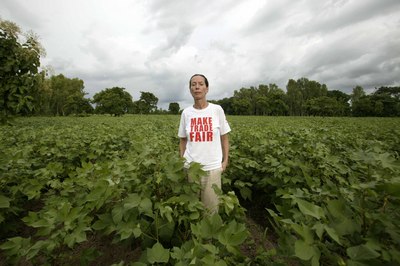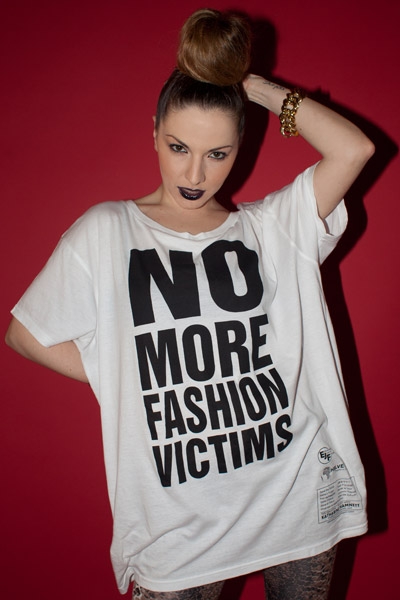
Katharine Hamnett is one of the most notorious ‘Eco-designers’ from Great Britain and this week was named a Commander of the Order of the British Empire by Queen Elizabeth II. In the UK this is recognised as one of the highest honors for any citizen of the U.K.
(image source: marieclaire.co.uk)
She received this as recognition for her determined commitment to ethical and environmental issues, and her great awareness campaigns and defiance as a social activist. She is known as THE originator of the slogan T-shirt including controversial slogans such as
Choose Life
World Peace Now
Clean Up or Die
Say No to The Euro
Use A Condom
Save Africa
As an iconic designer from the UK who graduated from the infamous London fashion school Central Saint Martins School of Art, and set up business by the age of twenty-one, it is no wonder Katharine Hamnett has held catwalk shows held in London, Paris, Milan, New York, Tokyo, Stockholm and San Paolo and gained herself an international clientele including many celebrities, film stars and musicians such as Bob Geldof, Gwyneth Paltrow, Mick Jagger to even Madonna, to name a few.
BUT it is her link to Africa that makes all the difference to AFG and the ethical fashion industry. Katharine Hamnett had undertaken various research into the effect and the impact of the huge industry of fashion and textiles and was thus invited by OXFAM to visit African cotton farmers in Mali.
She says:
“On a visit to Mali in Africa in 2003, I witnessed firsthand the devastating poverty faced by cotton farmers. I met a cotton farmer’s wife who had lost two children at the breast from malnutrition because she had nothing to eat. Her fate is typical of thousands of cotton farming families across Africa and the developing world.
When I was there I asked a cotton farmer what is the downside of growing cotton conventionally and he said, “When we have sold our crop we have nothing left.” I asked, “What is the upside of growing cotton organically?” He said, “When we have sold our crop all the money is ours and we have our health.”
I realised then that I had to help create demand for organic cotton clothing. I want people to appreciate that organic cotton can look and feel as good as conventional cotton but the difference to cotton farmers and their families is huge.
I’m hoping organic cotton clothing will catch on for all the right reasons.
The difference is ethical. By choosing organic cotton t-shirts you’ll feel how soft, stylish and luxurious they are. More importantly, you’ll help change thousands of lives for the better.”
(quote source: http://www.katharinehamnett.com/Campaigns/Organic-Cotton/)
Her aim was to visit the cotton farms and to promote Fair Trade. When Katharine met with African farmers she saw first hand how vast human suffering was within conventional cotton farmers and this caused her to re-launching and re-issuing her Eighties fashion slogan T-shirts made with organic cotton, and thus become a major proponent of organic cotton, By her visiting various government officials helped to raise awareness and key UK and International newspapers and television worldwide who then featured her photographs and interviewed her.
So now Katharine Hamnett has teamed up with Helvetas (a development cooperation in Switzerland with cotton programs. An AFG feature to follow) and the Environmental Justice Foundation team (a charity against environmental abuse – and to empower those affected by it) as they celebrate twenty years of organic cotton with a launch of her NO MORE FASHION VICTIMS t-shirt.
.
Modelled by Pixie Geldof and Ayah Marar exclusively from EJF’s web shop proceeds are used to support EJF’s work. The tees are made from 100% organic cotton from Mali (a Sub-Saharan African country where cotton fibre is one of the largest exports and makes up a lot of the export economy for the country and so stands as a huge trade importance to the population) Manufactured in India (you may ask why not in Africa – well watch out for the launch of the AFG website which will go into this in more detail). The tees also have certification by the well respected standard – Global Organic Textiles Standard (GOTS) and Fair Labour Organisation (FLO) showing that both the textiles and the manufacturing of the tees are produced fairly and with as much ethics as deemed possible.
So when are you gonna buy yours?
 (image source: http://www.ejfoundation.org.uk/shopforejf/index.php?route=product/product&path=20&product_id=108k)
(image source: http://www.ejfoundation.org.uk/shopforejf/index.php?route=product/product&path=20&product_id=108k)





simpleisthenewblack
June 4, 2011
Love the idea of ‘No More Fashion Victims’!
missmaty7
June 6, 2011
Hey Jacqui,
I didn’t even know a what a Commander of the Order was until you mention. I think your blog is quiet sexy. And this Katherine seems a bit like yourself who’se fallen in love with Africa.
xx
AFG-BLOG
June 6, 2011
Yeah she is definitely a woman of my own heart!